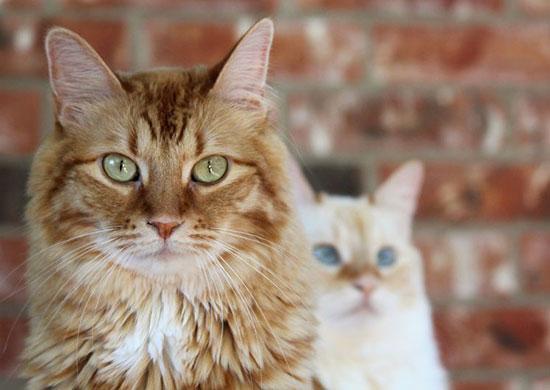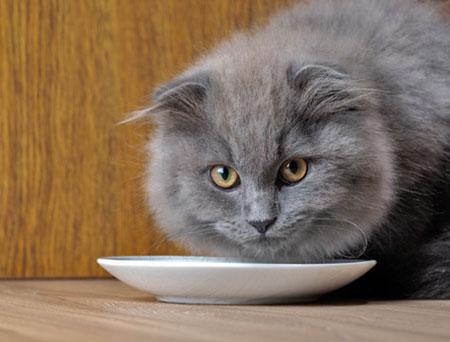This content is archived from the Feline Nutrition Foundation
Probiotics, Digestive Enzymes and Raw Cat Food
- Updated: Thursday, May 23, 2019 06:05 PM
- Published: Saturday, October 09, 2010 01:49 PM
- Written by Fern Crist, DVM
 I've heard it is recommended to add probiotics and digestive enzymes to cat food, especially when first transitioning from dry to raw food. Should I add these to the food when I mix up a batch or add them only when feeding each meal? I don't know if these two products are sensitive to storage and freezing.
I've heard it is recommended to add probiotics and digestive enzymes to cat food, especially when first transitioning from dry to raw food. Should I add these to the food when I mix up a batch or add them only when feeding each meal? I don't know if these two products are sensitive to storage and freezing.
I cannot answer this question without first addressing a deeper one: whether the addition of probiotics and digestive enzymes will actually aid in the transition to a new food. I find this recommendation on numerous websites, but what I don't find is any scientific support for it, or against it.
So, no scientific basis for a decision. Now what?
It is important that we understand that the absence of scientific support for a theory does not disprove the theory. It often means simply that the science has not yet been done. Some scientific minds think in terms of: "If it isn't proven, it must not be so." Such closed-minded hubris is a roadblock to true progress. I like this better: "If it isn't proven, but we see substantial anecdotal support for it, it might be so. This should be studied." The nature of science is continual change in what we perceive as truth.
The use of probiotics and digestive enzymes in food, not just for transitional purposes but all of the time, is strongly advocated by many. Probiotics are said to boost the immune system.¹ There is also some evidence that certain probiotics can alleviate diarrhea, at least in humans.² Digestive enzymes are, not surprisingly, assumed to aid in digestion. But this is not as simple as it may seem. Let's examine the idea.
Enzymes of many sorts are present in raw tissues, but are denatured by cooking. These enzymes in raw foods are said to be beneficial. Evidence to support this is almost completely anecdotal. Yet the volume of anecdotal evidence would force the strongest skeptic to at least examine the idea.
 Here's the logical problem with the enzyme theory: there's more than one way to denature an enzyme. Enzymes, being proteins, are denatured by strong acids, and there are not many acids stronger than what is in stomach of an obligate carnivore. Ingested enzymes are denatured in the stomach, so they aren't making it to the small intestine and hence cannot be helping with actual digestion. Many veterinary discussions of this subject stop right there. Enzymes are not getting past the stomach, so the whole idea must be faulty.
Here's the logical problem with the enzyme theory: there's more than one way to denature an enzyme. Enzymes, being proteins, are denatured by strong acids, and there are not many acids stronger than what is in stomach of an obligate carnivore. Ingested enzymes are denatured in the stomach, so they aren't making it to the small intestine and hence cannot be helping with actual digestion. Many veterinary discussions of this subject stop right there. Enzymes are not getting past the stomach, so the whole idea must be faulty.
This conclusion is poorly reasoned. If cats fed food with active enzymes are healthier, and the mass of anecdotal evidence supports this, then possibly the enzymes are acting not as an aid to digestion, but in some other way which we don't yet understand.
The flip side is that these enzymes appear to be safe.³ So why not add them? It is reasonable to use them based upon what we know anecdotally. Will they help with the transition process? That is unknown.⁴
Now back to your original question. Will they survive the freezing process?
The probiotic, being an active culture, will likely not. However, the base of many probiotics is animal digest, which is a flavor enhancer, and that will survive freezing. But, flavor enhancers work better when warm. So I would not mix the probiotics into the food prior to freezing, but add it at room temperature just before feeding.
Digestive enzymes will freeze just fine. No worries there. However, you are choosing raw cat food at least in part because it already has enzymes that cooked food does not. Will the addition of more give any benefit? Again, that is unknown. The only advice I can give on this question is that some enzyme preparations taste bad to cats and some don't. If you are going to do this, be sure you choose a preparation that won't turn your cat off the new food.
Additional Reading
Answers: Raw Cat Food for My Cat's Mystery Allergy?
Don't Let Calcium/Phosphorous Ratios Scare You
I hope my soapbox today will send some graduate student off to examine scientifically whether, and exactly how, enzymes in food provide health benefits.
And I hope that your cat will transition easily to a much more natural and healthy food!
Note: Feline Nutrition provides feline health and nutrition information as a public service. Diagnosis and treatment of specific conditions should always be in consultation with your own veterinarian. Feline Nutrition disclaims all warranties and liability related to the veterinary advice and information provided on this site.
Fern Crist, DVM is a graduate of the University of Georgia and has a feline-only practice in Fairfax, Virginia.
1. G. Solano Aguilar, T. Ledbetter, H.D. Dawson, K. Andrews, R.B. Harvey, N. Schoene and J.F. Urban, Jr, "The Effect of Probiotic Bacteria on the Immune System of Weaned Pigs Monitored by Real Time PCR," Proceedings of the 18th International Pig Veterinary Society Meeting, Hamburg, Germany, October 2004, 380.
A.R. Lomax and P.C. Calder, "Probiotics, Immune Function, Infection and Inflammation: A Review of the Evidence from Studies Conducted in Humans," Current Pharmaceutical Design 15, no. 13, 2009, 1428-1518.
2. Michael de Vrese and Philippe R. Marteau, "Probiotics and Prebiotics: Effects on Diarrhea," Journal of Nutrition, no. 137, March 2007, 803S-811S.
E.S. Huebner and C.M .Surawicz, "Probiotics in the Prevention and Treatment of Gastrointestinal Infections," Gastroenterology Clinics of North America 35, no. 2, June 2006, 355-365.
3. Consult with your veterinarian before adding probiotics or digestive enzymes to your cat's diet. It may not be advisable to add these supplements if your cat is immunosuppressed or diabetic.
4. Please see "How to Transition Your Cat to a Raw Diet."




